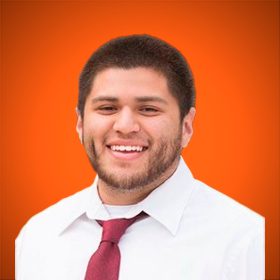Adrian Manriquez is a PhD student in applied psychology at Portland State University. He is a member of Health Policy Research Scholars Cohort 2021.
Tell us a little bit about yourself and what your research interests are.
I am a third-year PhD student in applied psychology, majoring in community psychology and minoring in mixed methods. My research interests are in the promotion of critical consciousness among Latino males enrolled in battering intervention programs (BIPs), understanding and preventing the transmission of intergenerational domestic violence in Latino families and households, and enhancing the quality and safety of father-child relationships between Latino males enrolled in BIPs and their children. My research is often conducted from theoretical frameworks of social ecology and critical race theory.
What’s the story behind why you’re doing what you’re doing?
As both a grandson of grandparent’s who immigrated from Mexico to the United States, and also as a child of Mexican-migrant working parents, I have witnessed health inequities affect Latino populations at disproportionate rates, without adequate responses from local, state, or federal governments. It is not uncommon for Latinos who have immigrated from Latin America, or who are natural-born U.S. citizens, to experience acculturative stress and various forms of racial discrimination, resulting in increased risk of developing mental illness, drug and alcohol dependency, and ultimately perpetrating intimate partner violence (IPV) against one’s partner and subjecting children to experiencing domestic violence (Alvarez et al., 2020; Mancera et al., 2017; Maldonado et al., 2020). Indeed, such IPV perpetration can spill over from individual’s family lives into their work lives (Johnson et al., 2005), and these behaviors of work-related IPV have been detected among Latinos (Mankowski et al., 2013). Such circumstances were prevalent in my family and in the Latino community that I was raised in. However, as I grew older, I became aware that Latino communities lacked the resources necessary to treat and prevent these issues from occurring. Therefore, solving health equity issues among Latino populations is of personal importance to me.
Tell us about a project you are currently working on that you are excited about.
Currently, I am exploring if and how critical consciousness may be promoted among Latino males enrolled in battering intervention programs (BIPs). I will be conducting focus groups with Latino male BIP participants and discussing with them about their experiences of oppression from multiple ecological levels of analysis, and assessing how such experiences of oppression influence their perpetration of intimate partner violence (IPV) within their own intimate relationships. Additionally, I will be talking to these men about how they view critical consciousness as being a potential part of their BIPs’ curricula and how incorporating critical consciousness into their BIPs’ programming could aid in their engagement and completion of attending a BIP.
For people unfamiliar with your research area, what is one piece of information you think is important for them to know?
Latino males with histories of perpetrating IPV are humans too and deserve to be treated with humanity by criminal justice responses to IPV perpetration. This entails understanding that while Latinos who use IPV behaviors may be acting as oppressors within their own intimate relationships, they also experience oppression within other segments of society, and it is important to learn how this oppression gives rise to IPV amongst Latino communities.
Who is a researcher you admire and why?
Dr. Sinead Younge. She is a community psychologist who works at Morehouse College. I admire her as a researcher because her research never ends at being published, it is always translated into some form of action. And to me, that is inspiring because so many academics just publish for the sake of publishing. Her praxis is on another level, truly, and that influences me to make sure that I am always doing something of value for the communities that I conduct research with.
How do you think HPRS will complement your doctoral training?
HPRS has provided me with all of the tools, resources, social support, and knowledge that is necessary for using empirical research to inform health policies that aim to promote health equity. So, while my doctoral program has provided me with the skillset needed to conduct rigorous, ethical research in the areas of phenomena that I am interested in exploring, HPRS has provided me with the ability to translate this research into something that can be used to inform policy development and implementation. I would not have this ability if it was not for HPRS!
What part(s) of HPRS excite you the most?
I love any and every opportunity that I am presented with that allows me to talk with my fellow HPRS participants. I always gain a tremendous amount of inspiration from the important work that every HPRS scholar is doing in their respective PhD programs.
In the RWJF HPRS program we will work with you to help you think further about using your research to develop policy. If you could use your research to change any policy, what policy would it be?
If my research were to change any policy, it would be used to advocate for funding for BIPs in the state of Oregon. More specifically, I believe that BIP programming should be free for low-income males who are court-mandated to attend a BIP, as finances are frequently a barrier to program attendance and/or completion for men of lower socioeconomic statuses. I would like to use my research to inform policy development in this particular area.
Here’s a fun question to wrap things up. If you had a talk show, who would your first three guests be?
If I had a talk show, my first three guests would be as follows: 1) Stevie Wonder 2) Kiese Laymon 3) Dolores Huerta.

